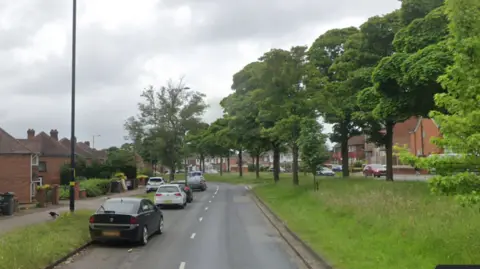Inquest jury told not to record a police pursuit
 Google
GoogleJurors at the inquest into the death of a man who crashed his car into a tree while being followed by police must not record that there was a pursuit, a coroner has said.
The jury retired to consider their conclusion in the inquest of Muhammad Qasim at Birmingham Coroner's Court on Tuesday morning after four days of evidence.
The 29-year-old suffered "catastrophic" head injuries when he crashed his BMW into a tree on a central reservation on Island Road in Birmingham in the early hours of 2 October 2023 and died in hospital later that day.
He was being followed at the time by a marked police car driven by West Midlands Police response officer PC Paul Withers.
PC Withers told the inquest the BMW first came to his attention because it was speeding in a 30mph zone on nearby Church Lane.
Mr Qasim, who had two passengers in the car at the time of the crash, was over the drink-drive limit, had recently used cannabis, was speeding and not wearing his seatbelt when he failed to negotiate a left-hand bend in the road and suffered fatal injuries after being ejected from the vehicle.
He had been doing "loops" of Island Road, with the police car following, and had suggested to his passengers that he was going to stop the car and they should run just before the collision, the inquest heard.
Mr Withers told the court he had been "perplexed" by the BMW driver's behaviour as they did not appear to be trying to put distance between them and the police car in the way he had usually seen when a driver is trying to evade the police.
'Not a pursuit'
Two police driving experts last week told the inquest they had no criticism of Mr Withers' driving before the BMW crashed.
They accepted that the officer, who was not trained to carry out police pursuits, was following the vehicle to gain intelligence, such as the registration plate, so database checks could be made.
As such, the jury may not record that any part of the incident amounted to a police pursuit, senior coroner Louise Hunt told them before they retired to start their deliberations.
She said: "I have a legal direction to give you and you must accept it. In light of the expert evidence, you may not record that any part of the events amounted to a police pursuit.
"Both experts agreed they had no criticism of the way PC Withers was driving and was entitled to follow the vehicle to ascertain further intelligence.
"There were questions of the expert witnesses about whether PC Withers was in a pursuit at any time.
"Both agreed there was not a pursuit at any time as he did not indicate to Mr Qasim any requirement to stop at any stage."
'No difference to outcome'
Both experts - Jonathan Little, chief driving instructor for Staffordshire Police and Paul Trowman, the chief driving instructor for West Midlands Police - were asked whether a spontaneous police pursuit happened.
According to College of Policing guidance, a spontaneous pursuit occurs when the actions of the suspect driver in deciding to flee are triggered by the presence of a police vehicle, and there is no prior warning or sufficient time to develop a specific strategy or plan.
Mr Little felt that a spontaneous pursuit may have started on the final "loop" of Island Road, just before the crash happened, but both experts agreed that even if it had, the crash would likely still have happened because of Mr Qasim's speed and contributory factors of alcohol intoxication and drugs.
Mrs Hunt said: "They both agreed that whether or not there was a pursuit made no difference to the outcome as the crash was simultaneous to the start of any pursuit."
She added that the jury must decide the case based solely on the evidence heard in the courtroom and must come to a unanimous decision.
Follow BBC Birmingham on BBC Sounds, Facebook, X and Instagram.
